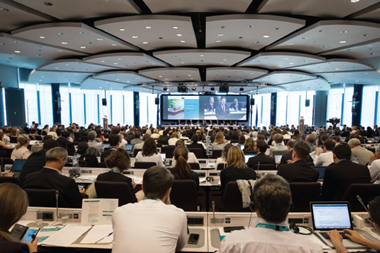Dutch pension funds should expect to be quizzed by their supervisor about their approach to climate-related risks, according to a report published by De Nederlandsche Bank (DNB) yesterday.
The financial regulator said it intended to embed climate-related risks more firmly in its supervision with the aim of ensuring sustainable financial stability.
It will incorporate climate-related risks in its assessment frameworks and address them in its interviews with supervised institutions, it said. These include pension funds and insurers.
DNB is currently working on a stress test for risks arising from the transition to a lower-carbon economy. It is approaching this from macroeconomic and macro-prudential perspectives.
Pension funds needed to broaden their approach to assessing energy transition implications as they, and insurers, often seemed to limit their considerations to their actively-managed equity portfolios, said DNB.
“[A] more holistic approach regarding their total balance sheet is in most cases lacking,” it said.
Real estate risks
The regulator also warned that a new sustainability requirement for Dutch buildings could pose risks for pension funds.
Due to be effective from January 2023, the requirement means all office buildings must have at least a “level C” energy label, or else they must be taken out of use.
It found that pension funds and insurers were less exposed to commercial real estate with lower range energy labels than banks were, but said that “as the owners of these buildings, pension funds and insurers are directly responsible for investing in sustainability measures”.
Dutch pension funds have invested 9% in commercial real estate and their mortgage portfolios continue to grow, DNB said.
The regulator added the investment impact depended on a number of factors and that it did not have a comprehensive overview of the label distribution of all investments and loans related to office buildings.
Focusing on the physical impacts of climate change, DNB said that banks, insurers and pension funds needed to take into account the risk of flood damage impairing investments.
The risk could be realised if flooding necessitated substantial public spending and shrank tax revenues, thereby triggering credit downgrades and affecting sovereign bonds held by pension funds, insurers and banks.
With regard to risks from an energy transition, a DNB survey found that 12.4% of Dutch pension funds’ balance sheets were exposed to carbon-intensive sectors facing increased transition risks.
On a positive note, the regulator found that Dutch pension funds and other financial institutions appeared to have only limited exposures to countries deemed most vulnerable to climate change.
It came up with this assessment after applying a “vulnerability index”.
Green finance warnings
DNB also cautioned that growth of the market for green finance could lead to a “green bubble”, where investments were overvalued and asset prices had to be adjusted.
It also said that financial institutions should be aware of the risk of reputational damage due to greenwashing of products such as green bonds.
There appeared to be a need for more “unambiguous standards” for green investments, the regulator said. Supervisors should not relax rules to promote sustainable finance, it added.
“We have noticed that some parties are calling for such action at national and international fora, often arguing that capital requirements imposed on sustainable finance should be lowered,” it said.
However, in DNB’s view capital requirements should not be lowered to realise social objectives, as their purpose was to absorb unexpected losses and must therefore adequately reflect properly quantified risks.
Also, pricing negative externalities and fiscal incentives were more effective and efficient options for achieving climate goals, it said.
DNB’s report is available here.









